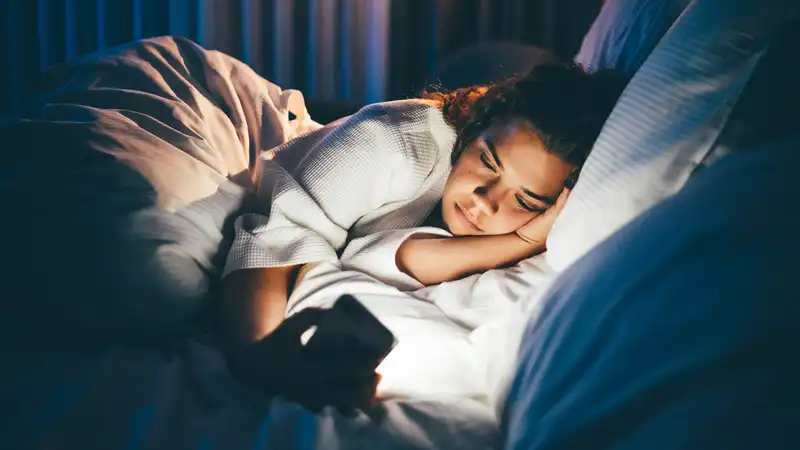Are you a night owl or a morning lark? We all work on a sleep schedule that works for our unique life routines and rhythms, but many of us describe ourselves as either a natural early riser, someone who prefers to stay up late at night, or someone who sits somewhere in the middle
However, new research suggests that staying up late may harm our mental health A large study conducted by scientists at Stanford Medicine shows that people who admit to being awake in the early hours of the morning have a higher incidence of mental health disorders, including depression and anxiety
Regardless of whether study participants were awake late as needed or following their natural urge to burn midnight oil, the researchers found that going to bed after 1am had a detrimental effect on their mental health
Here we take a closer look at what this study means for our sleep behavior and explore ways to shift sleep patterns with the help of a certified psychologist
There are also biological reasons why we tend to get up late, get up early, or sit somewhere in between both, as well as our schedules and routines This is due to our chronotype, which helps us determine when we feel the natural urge to sleep
As well as when you feel you are most prone to falling asleep, our chronotype, which is determined by genetics, age and other factors, can also affect your central body temperature and your eating habits There are 4 main chronotypes, each having a different preferred window of productivity, wakefulness time and sleep time
Unlike our circadian rhythms (the body's internal clock), you cannot change your chronotype That doesn't mean you can't sleep outside of what you feel most natural, but it can be hard to maintain a sleep schedule that goes against your chronotype
Stanford Medical researchers tracked the sleep habits of more than 73,888 adults in the UK, each identified as morning-type, evening-type, or somewhere in the middle At the end of the study, they found that evening types were more likely to suffer poorer mental health
The results (high incidence of mental and behavioral disorders) remained the same, regardless of whether study participants were awake late as needed or following natural impulses determined by their chronotype
"Here we found that consistency with your chronotype is not important and that being really slow is not good for your mental health," Dr Jamie Zeitzer, a professor of psychiatry and behavioral sciences and senior author of the study, told the Stanford Medical News Center "It's a big unknown reason
The study found that the morning type, those who go to bed early and wake up early, had the best mental health among all groups
If you're up late trying to shift your sleep schedule to the early hours of the morning, you can We spoke to Dr Lindsay Browning, a certified psychologist and neuroscientist, early last year to find out exactly how to fix a broken sleep schedule Whether your nighttime habits are skewed due to parenting and night procrastination, here are some tips to retrain your body to sleep early
If you are currently going to bed at 1am and want to be in bed by 11pm, jump to bed at 10:55pm and do this You can expect to resist the urge to do so
"Yes, you can fix this straight and get up two hours earlier than you are now, but it is easily feasible for you to shift sleep in your sleep schedule "1 day 20 minutes over several days, with no adverse effects at all
Using this method means you can shift your sleep schedule to 1 hour in advance during one weekend
If you are adjusting your bed time, you should adjust your waking time, too "Remember, if you're setting bedtime back to 20 minutes at night, you need to set your wake time back to 1 minute 20 minutes in the day," Dr Browning says "And it's really important to get up right awayBecause if you put it to bed, then all this work is meaningless 1 Pressing the snooze button several times is one of the worst things you can do for sleep"
" Owl types need to set a bedtime reminder, otherwise, before they know it, it's 2 am and they're at work "All that happens there is that the owl falls asleep" On weekends, resist the temptation to go to bed late and get up late"
As a stay-up, if you skip breakfast and don't eat until around 11 am, your body doesn't think it's morning until 11 am, so you have to think about it when you're eating, too"Even if you can't face eating a full breakfast when you wake up, prepare a little thing to wake up your digestive system It is not Otherwise, you will be sleepwalking throughout the morning"
We may not be able to change the chronotype, but we can adjust the circadian rhythm - and 1 of the most effective tools at our disposal is natural sunlight "Owls aren't the best first, so it's more important to have a really good sun exposure first to boost them to feel more awake," Dr Browning explains
Early morning sun exposure prompts your body to produce a hormone called serotonin, which helps you stay alert and refreshed Serotonin will later become metabolized into melatonin, a hormone that helps signal to your body that it's time for sleep that will make it easier for you to nod at night










Comments